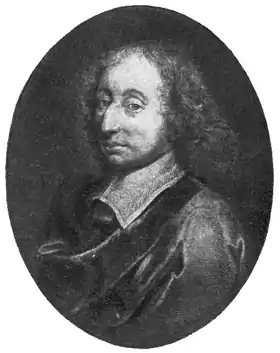
PASCAL
THE HARVARD CLASSICS
EDITED BY CHARLES W ELIOT LL D
❦
BLAISE PASCAL
THOUGHTS
TRANSLATED BY W F TROTTER
LETTERS
TRANSLATED BY M L BOOTH
MINOR WORKS
TRANSLATED BY O W WIGHT
WITH INTRODUCTIONS, NOTES
AND ILLUSTRATIONS

"DR ELIOT'S FIVE FOOT SHELF OF BOOKS"
P F COLLIER & SON
NEW YORK
Copyright, 1910
By P. F. Collier & Son
Designed, Printed, and Bound at
The Collier Press. New York
| THOUGHTS | |||||
| |||||
| Section II | |||||
| |||||
| Section III | |||||
| |||||
| Section IV | |||||
| |||||
| Section V | |||||
| |||||
| Section VI | |||||
| |||||
| Section VII | |||||
| |||||
| Section VIII | |||||
| |||||
| Section IX | |||||
| |||||
| Section X | |||||
| |||||
| Section XI | |||||
| |||||
| Section XII | |||||
| |||||
| Section XIII | |||||
| |||||
| Section XIV | |||||
| |||||
| LETTERS | |||||
| |||||
| |||||
| |||||
| |||||
| |||||
| |||||
| |||||
| |||||
| |||||
| |||||
| |||||
| |||||
| MINOR WORKS | |||||
| |||||
| |||||
| |||||
| |||||
| |||||
| |||||
| |||||
| |||||
| |||||
| |||||
| |||||
NOTE
Passages erased by Pascal are enclosed in square brackets, thus [ ]. Words, added or corrected by the editor of the text, are similarly denoted. The translation is from the text of Brunschvicg.
INTRODUCTORY NOTE
Blaise Pascal was born at Clermont in Auvergne on June 19, 1623, the son of the president of the Court of Aids of Clermont. He was a precocious child, and soon showed amazing mathematical talent. His early training was scientific rather than literary or theological, and scientific interests predominated during the first period of his activity. He corresponded with the most distinguished scholars of the time, and made important contributions to pure and applied mathematics and to physics.
Meantime, an accident had brought the Pascal family into contact with Jansenist doctrine, and Blaise became an ardent convert. Jansenism, which took its name from Jansenius, the bishop of Ypres, had its headquarters in the Cistercian Abbey of Port-Royal, and was one of the most rigorous and lofty developments of post-Reformation Catholicism. In doctrine it somewhat resembled Calvinism in its insistence on Grace and Predestination at the expense of the freedom of the will, and in its cultivation of a thoroughgoing logical method of apologetics. In practise it represented an austere and even ascetic morality, and it did much to raise the ethical and intellectual level of seventeenth century France.
Jansenism was attacked as heretical, especially by the Jesuits; and the civil power ultimately took measures to crush the movement, disbanding the nuns of Port-Royal, and by its persecutions affording to many of the Jansenists opportunities for the display of a heroic obstinacy. In this struggle Pascal took an important part by the publication, under the pseudonym of "Louis de Montalte," of a series of eighteen letters, attacking the morality of the Jesuits and defending Jansenism against the charge of heresy. In spite of the fact that the party for which he fought was defeated, in these "Provincial Letters," as they are usually called, Pascal inflicted a blow on the Society of Jesus from which that order has never entirely recovered.
Pascal now formed the plan of writing an "Apology for the Christian Religion," and during the rest of his life he was collecting materials and making notes for this work. But he had long been feeble in health; in the ardor of his religious devotion he had undergone incredible hardships; and on August 19, 1662, he died in his fortieth year.
It was from the notes for his contemplated "Apology" that the Port-Royalists compiled and edited the book known as his "Pensées" or "Thoughts." The early texts were much tampered with, and the material has been frequently rearranged; but now at last it is possible to read these fragmentary jottings as they came from the hand of their author. In spite of their incompleteness and frequent incoherence, the "Thoughts" have long held a high place among the great religious classics. Much of the theological argument implied in these utterances has little appeal to the modern mind, but the acuteness of the observation of human life, the subtlety of the reasoning, the combination of precision and fervid imagination in the expression, make this a book to which the discerning mind can return again and again for insight and inspiration.

| Original: | This work was published before January 1, 1927, and is in the public domain worldwide because the author died at least 100 years ago. |
|---|---|
| Translation: | This work was published before January 1, 1927, and is in the public domain worldwide because the author died at least 100 years ago. |